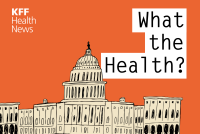Latest Morning Briefing Stories
KFF Health News' 'What the Health?': The Crisis Is Officially Ending, but Covid Confusion Lives On
The public health emergency declaration for covid-19 ends May 11, ushering in major changes in how Americans can access and pay for the vaccines, treatments, and tests particular to the culprit coronavirus. But not everyone will experience the same changes, creating a confusing patchwork of coverage — not unlike health coverage for other diseases. Meanwhile, outside advisers to the FDA formally recommended allowing a birth control pill to be sold without a prescription. If the FDA follows the recommendation, it would represent the first over-the-counter form of hormonal contraception. Margot Sanger-Katz of The New York Times, Tami Luhby of CNN, and Joanne Kenen of the Johns Hopkins Bloomberg School of Public Health and Politico join KFF Health News’ Julie Rovner to discuss these issues and more. Plus for “extra credit” the panelists suggest health policy stories they read this week they think you should read, too.
An Arm and a Leg: Mental Health ‘Ghost Networks’ — And a Ghostbuster
What should you do when your search for an in-network mental health care provider comes up empty? Abigail Burman has some expertise to share.
Medi-Cal Enrollees: Here’s How to Verify Your Eligibility
California’s safety-net health program has resumed annual eligibility checks after three years, which means beneficiaries will need to provide updated personal information to maintain coverage. Here’s what to watch for.
Beneficiarios de Medi-Cal: cómo verificar si eres elegible
Medi-Cal, la versión de Medicaid en California, puso en marcha una iniciativa de 14 meses para reexaminar la elegibilidad de sus casi 15.8 millones de miembros.
KFF Health News' 'What the Health?': Health Programs Are at Risk as Debt Ceiling Cave-In Looms
A warning from the Treasury Department that the U.S. could default on its debt as soon as June 1 has galvanized lawmakers to intervene. But there is still no obvious way to reconcile Republican demands to slash federal spending with President Joe Biden’s demand to raise the debt ceiling and save the spending fight for a later date. Meanwhile, efforts to pass abortion bans in conservative states are starting to stall as some Republicans rebel against the most severe bans. Joanne Kenen of the Johns Hopkins Bloomberg School of Public Health and Politico, Rachel Cohrs of Stat, and Alice Miranda Ollstein of Politico join KFF Health News chief Washington correspondent Julie Rovner to discuss these issues and more.
Readers and Tweeters Defend the Rights of Adults With Disabilities
KFF Health News gives readers a chance to comment on a recent batch of stories.
For Sacramento Teen, Medi-Cal Coverage of Early Psychosis Treatment Proved a Lifesaver
A Medi-Cal patient illustrates how early schizophrenia treatments can yield big benefits. Advocates want California to expand such services to more people living with severe mental illness, which they argue will not only improve lives but also save money over time.
Expectant Mom Needed $15,000 Overnight to Save Her Twins
Doctors rushed a pregnant woman to a surgeon who charged thousands upfront just to see her. The case reveals a gap in medical billing protections for those with rare, specialized conditions.
KFF Health News' 'What the Health?': Will They or Won’t They (Block the Abortion Pill)?
The Supreme Court is considering the future of the abortion pill mifepristone, after GenBioPro sued the FDA over limitations that effectively block generic production of the drug, a major part of the market. Congress is considering proposals that would impose Medicaid work requirements, crack down on pharmacy benefit managers, and more. And President Joe Biden moved to expand health coverage to young immigrants known as “Dreamers.” Rachel Cohrs of Stat, Sandhya Raman of CQ Roll Call, and Joanne Kenen of the Johns Hopkins Bloomberg School of Public Health and Politico join KFF Health News’ Mary Agnes Carey to discuss these issues and more.
Lose Weight, Gain Huge Debt: NY Provider Has Sued More Than 300 Patients Who Had Bariatric Surgery
The private equity-backed practice has been known to demand more than $100,000 in charges or penalties. One patient is fighting back.












